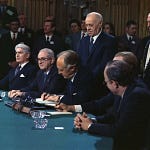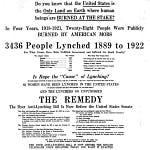This Day in Legal History: Andrew Johnson is a Scoundrel
On this day in legal history, March 27, 1866, President Andrew Johnson enacted one of the most consequential vetoes in American history. Johnson vetoed the Civil Rights Bill, a pivotal piece of legislation intended to extend full U.S. citizenship to all former slaves and to fundamentally reshape the landscape of civil rights in the aftermath of the Civil War. This bill was a direct response to the Black Codes, laws passed by Southern states that severely restricted the rights of newly freed African Americans.
Johnson, a Southern Democrat who ascended to the presidency after Lincoln's assassination, argued that the bill encroached upon states' rights and would lead to federal overreach. His veto underscored a profound political and ideological rift between the President and the Radical Republicans in Congress, who advocated for more stringent Reconstruction policies and greater protections for former slaves.
The veto of the Civil Rights Bill did not mark the end of the struggle for equality; rather, it galvanized Congress to action. In a rare and historic move, Congress overrode Johnson's veto in April 1866, marking the first time in U.S. history that a major piece of legislation became law over a presidential veto. This event signaled a shift in the balance of power between the executive and legislative branches and underscored the growing commitment of the federal government to civil rights.
The passage of the Civil Rights Bill set the stage for the 14th Amendment, which would be ratified two years later in 1868. The amendment enshrined in the Constitution the principles of birthright citizenship and equal protection under the law, fundamentally transforming the nature of American citizenship and laying the groundwork for future civil rights advancements. Johnson's veto, and the legislative response it provoked, remain a testament to the turbulent and transformative nature of the Reconstruction era, highlighting the enduring struggle for justice and equality in the United States.
The U.S. Justice Department strategically filed its significant antitrust lawsuit against Apple Inc. in New Jersey, aiming to leverage the Third Circuit Court's history of plaintiff-friendly rulings in monopoly cases. This move is part of the broader Biden administration effort to regulate the dominance of Big Tech through antitrust law, targeting practices Apple uses to maintain its smartphone market monopoly. The Third Circuit, known for its openness to cracking down on monopolistic behavior, contrasts with other circuits perceived as more defendant-friendly in antitrust matters.
Legal experts point out the Third Circuit's precedents in supporting the government's stance against monopolistic practices, citing past rulings against companies like Dentsply and 3M Co. for violating the Sherman Act. These precedents underline the court's stricter standards for monopolists, relevant to the DOJ's allegations against Apple for Section 2 violations of the same act. The choice of New Jersey also reflects tactical considerations regarding subpoena power and the desire for a court that might approach the case with fresh eyes, avoiding circuits like the Ninth, where Apple has previously secured favorable rulings.
The DOJ's lawsuit, joined by New Jersey and other states, underscores the strategic legal and geographic considerations at play in selecting a venue. This reflects a deliberate effort to position the case advantageously within the U.S. legal landscape, aiming for a fresh judicial examination of Apple's business practices and their impact on competition and consumers.
DOJ’s Apple Suit Filed in New Jersey for Friendly Third Circuit
The 5th US Circuit Court of Appeals has temporarily halted a Texas law, SB4, which authorizes state officials to arrest, detain, and deport individuals entering the U.S. illegally, pending an appeal. This decision represents a temporary victory for the Biden administration in a legal battle with significant ramifications for U.S. immigration policy. The court's 2-1 ruling maintains the suspension of the law, following a lower court judge's determination that it conflicts with federal immigration statutes.
Chief Judge Priscilla Richman, writing for the court, underscored that immigration enforcement predominantly falls within federal jurisdiction, despite Texas' efforts to address what it perceives as a failure by Congress to fund adequate responses to increased illegal entries into the United States. She emphasized that Texas cannot assume the federal government's role in immigration matters according to the Constitution and laws.
The contested law has caused considerable confusion and uncertainty in Texas, especially regarding its potential enforcement mechanisms. Texas officials argue that SB4 is necessary to mitigate the border crossing influx, criticizing federal inaction. Conversely, the Biden administration contends that the law unlawfully encroaches on federal authority to manage immigration policy and could hinder border management efforts.
The appeals court noted that the Texas statute would likely disrupt the federal government's established processes for managing the removal of individuals in the country illegally, pointing out the federal system's complexity and national scope. The 5th Circuit is set to further review the state's appeal of a February ruling by US District Judge David Ezra, who blocked the law on grounds that it would effectively nullify federal law and authority. Oral arguments for the appeal are slated for April 3, as the broader legal challenge to SB4's enforceability continues, with the federal government, a Texas border county, and immigrant rights organizations seeking its permanent injunction.
Texas Deportation Law Stays Blocked Until Appeal Is Resolved (1)
Disney has settled a lawsuit with the state of Florida, marking the end of its dispute with Governor Ron DeSantis. This resolution came about after a board, appointed by DeSantis to manage the Central Florida Tourism Oversight District which oversees Disney's operations in the region, accepted Disney's settlement offer. The conflict, lasting nearly a year, stemmed from Disney's implementation of certain changes that diminished the municipal authority's powers, specifically limiting the new board's oversight on theme park expansions and billboard advertising.
These changes were enacted just before the takeover by the DeSantis-appointed board, leading to a significant legal and public relations battle between the state and Disney, one of Florida's largest employers. Under the terms of the settlement, Disney has agreed to withdraw these controversial changes, thereby restoring the authority of the municipal board.
Jeff Vahle, president of Walt Disney World Resort, expressed satisfaction with the settlement, highlighting that it not only concludes the ongoing litigation in Florida's state court but also initiates a period of positive engagement with the district's new leadership. He emphasized that this agreement facilitates further investments and job creation in Florida, benefiting both the state's economy and its workforce. This settlement represents a significant step towards resolving the tensions between Disney and the Florida government, opening the door to future cooperation and development.
Disney Ends Fight With Ron DeSantis by Settling Florida Lawsuit
Florida governor, Disney reach settlement | Reuters
A consumer lawsuit accusing Apple of anti-competitive practices related to cryptocurrency transactions in its App Store was dismissed by a federal judge in San Francisco. The lawsuit, filed in November 2023, claimed Apple's restrictions on cryptocurrency technology stifled competition and increased transaction fees for services like Venmo and Cash App. U.S. District Judge Vince Chhabria criticized the lawsuit as "speculative," identifying several critical flaws, but allowed the plaintiffs 21 days to amend their complaint. Apple, which has faced various antitrust challenges, including a notable lawsuit from the U.S. Justice Department over smartphone market monopolization, denied any wrongdoing. This dismissal adds to the ongoing debate about Apple's influence on app market competition and its regulatory compliance amidst growing legal scrutiny.
Apple defeats consumers' crypto-payment antitrust case for now | Reuters
Hunter Biden is set to request the dismissal of tax evasion charges against him, claiming the case is politically motivated. His legal team will argue before a Los Angeles federal court that the prosecution was influenced by Republican scrutiny of his father, President Joe Biden. Hunter has pleaded not guilty to charges of evading $1.4 million in taxes from 2016 to 2019, despite having repaid the amount. His trial is scheduled for June, ahead of the contentious November presidential election. Additionally, Hunter faces separate charges in Delaware related to the alleged purchase of a handgun while using illegal drugs, to which he has also pleaded not guilty. His defense includes claims of selective prosecution and challenges the appointment of Special Counsel David Weiss, asserting the case should be dismissed due to an earlier plea deal that fell through.
Hunter Biden to ask judge to dismiss tax charges as politically motivated | Reuters













